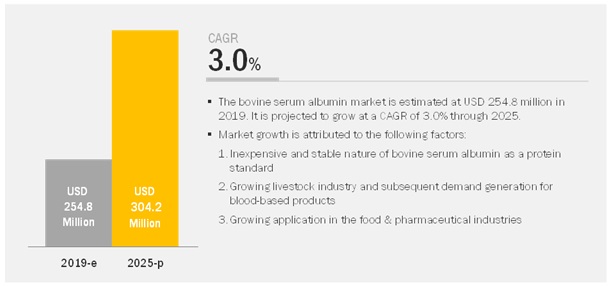The global bovine serum albumin market is projected to grow from USD 254.8 million in 2019 to USD 304.2 million by 2025, at a CAGR of 3.0%. The global bovine serum albumin market is growing due to changing consumer preferences for a protein-rich diet and high demand from the life sciences industry.
Download PDF Brochure
Driver: Inexpensive and stable nature of bovine serum albumin as a protein standard
Most research organizations make use of bovine serum albumin as a protein standard. It is used to determine the unknown quantities of other proteins by comparing the known quantities of bovine serum albumin. For instance, it is used in Bradford protein assay, a method used to measure the concentration of total protein in a sample, as the stable nature of the serum albumin helps in increasing the signal in assays. Also, bovine serum albumin does not have any effect on many biochemical reactions, which makes scientists in the industry prefer it.

Restraint: Rise in demand for animal-free albumin products
Albumin finds extensive use in biopharmaceuticals, vaccines, and medical device products, among others. The major sources of albumin include human and bovine serum. Blood-borne contaminants have stirred regulatory concerns since issues related to quality and safety might arise within the products that are manufactured using blood as the major ingredient.
Opportunity: Scope for use as a dietary protein for fat reduction
It has been established that this serum albumin is a dietary whey protein that has anti-obesity effects. A research experiment funded by the Republic of Ireland, which is responsible for research and development, training, and advisory services in the food & beverage industry, stated that the intake of BSA as a part of the low-fat diets prevents weight gain. Since obesity is a global problem that has high costs associated with it, the need for a cost-effective solution to tackle the issue of obesity is growing. BSA is a protein that can be easily sourced as a by-product of cheese manufacturing due to which the cost of using it as a potent dietary solution is higher.
Challenge: Existence of alternatives in the diagnostic and pharmaceutical industries
Bovine serum albumin has a significant disadvantage when serving as a protein standard; it exhibits a strong response to dyes due to which there is a possibility of underestimating the protein concentrations within the samples that are being tested. Bovine serum albumin has applications in the pharmaceutical and diagnostics industry due to its abundance, low cost, ease of purification, and unusual ligand-binding properties.